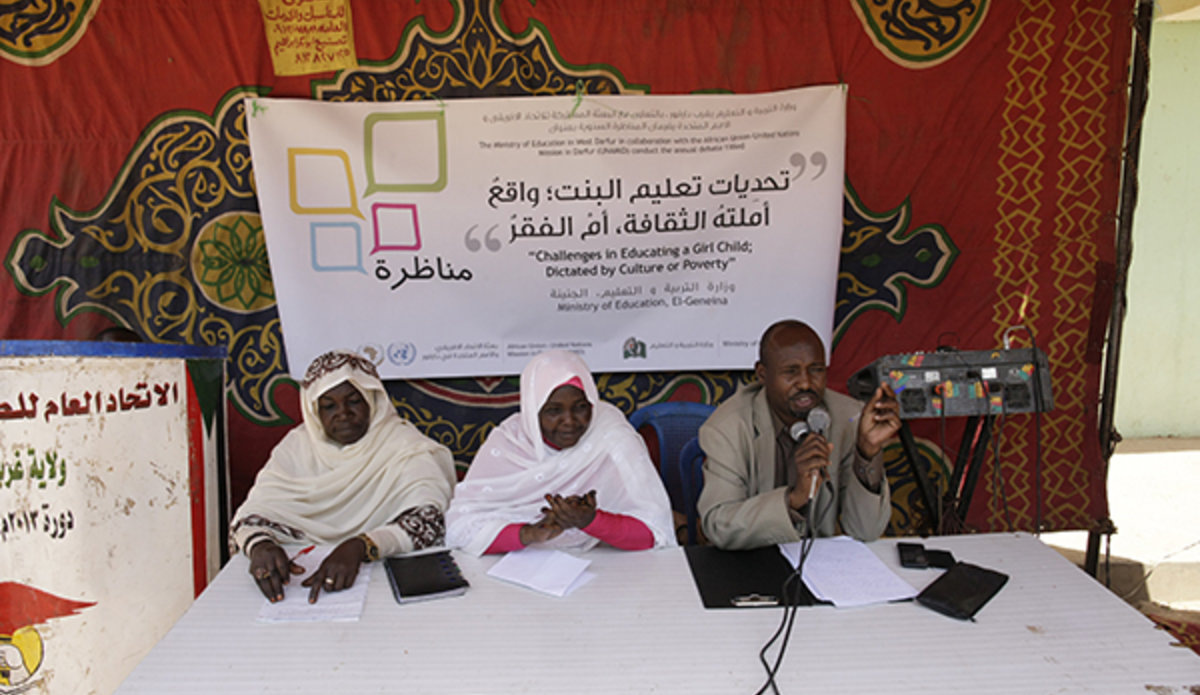Hundreds Participate in Annual Debate on Girls' Education in West Darfur
On 2 March 2016, UNAMID’s Communications and Public Information Section, in partnership with the Mission’s Gender Advisory Unit and the Ministry of Education, West Darfur state, organized the annual debate under the theme: “Girl Child Education- Dictated by Culture or Poverty?” The event, held in El Geneina, the capital of West Darfur, brought together around 250 participants including teachers, students and representatives from the native administrations, local government, civil institutions, civil society organizations and academics.
The Debate, held at the premises of the Ministry of Education in El Geneina, was aimed at providing a forum to explore views on challenges facing girl education and the possible approaches that can be adopted to enhance education of girls in Sudan, more specifically in Darfur. Additionally, the Debate was aimed at raising public awareness about women’s right to education, which is a fundamental human right found in Article 26 of the 1948 Universal Declaration of Human Rights.
Addressing the opening session of the Debate, the Wali (Governor) of West Darfur, Dr. Khalil Abdallah Mohammed, said he hoped that the Debate will not only address girl education, but education in general, especially education for the nomads, since education is the basis for achieving developmental renaissance. “Culture and economy are the main challenges facing girl education. I reiterate Government’s support to women and girls recognizing the significant role they play in their local communities and the good impact education can have on women’s economic situation. I urge the native administration in west Darfur to play a greater role in supporting education by encouraging parents to send their children to schools” Dr. Mohammed added.
For her part, Officer-in-Charge, UNAMID Sector West office, Ms. Takako Ugaya, referred to the difficulties preventing a high number of children from getting access to education globally, especially the girls. She stated that this annual debate comes as part of a 16-day campaign and focuses specifically on girls’ right to education with a highlight on poverty and cultural constraints. “Let us take home the message on the importance of girl education, which leads to the reduction of maternal mortality, child mortality and early marriage along with improvements in women’s lives” she concluded.
The West Darfur Minister of Education, Ms. Ferdous Hussein Salih, commended UNAMID for funding the debate. She emphasized the importance of organizing such events in the villages to increase people’s awareness on the importance of education, especially girl education, indicating that the recommendations that come out of this debate will be supported by the Wali (Governor) for easy implementation.
During the deliberations, the participants observed that the accumulation of economic problems, cultural, social and political factors, in addition to some government policies had resulted in regression of girls’ education, and recommended the stakeholders to provide free education, intensify awareness programmes on education and support education programmes for the disabled in the community.
In concluding the Debate, election cards were distributed to participants: 53 affirmed Culture as dictating Girl Education, 37 voted for Poverty, 12 voted for a combination of Poverty and Culture and 2 voted for other unexplained factors.
 UN
UN United Nations Peacekeeping
United Nations Peacekeeping


